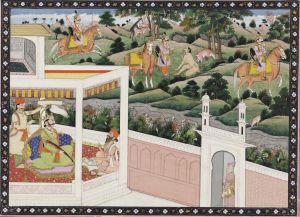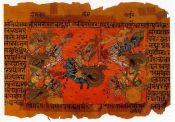Kindama: Difference between revisions
From Zoophilia Wiki
Jump to navigationJump to search
meta>Divyam Seth |
meta>Capankajsmilyo rm unsourced, feel free to add back with source |
||
| Line 1: | Line 1: | ||
[[File:Pandu Shoots the Ascetic Kindama.jpg|thumb|right|King [[Pandu]] shoots Kindama]] | [[File:Pandu Shoots the Ascetic Kindama.jpg|thumb|right|King [[Pandu]] shoots Kindama]] | ||
In the [[Hindu]] epic ''[[Mahabharata]]'', '''Kindama''' was a [[rishi]] who lived in the woods. | In the [[Hindu]] epic ''[[Mahabharata]]'', '''Kindama''' was a [[rishi]] who lived in the woods. Kindama was a very bashful person and his overriding feelings of modesty prevented him from having sex in the company of other humans. To satisfy his sexual desires, Kindama used his powers to turn himself and his wife into a deer. Once he and his mate were having [[Sexual intercourse|intercourse]] in the woods. King [[Pandu]] of [[Hastinapur]], who had been hunting there, shot them mistaking them for deers, seriously injuring them. Enraged Kindama (still in deer form) berated the king for having killed him before he had finished the act of copulation. Before dying, Kindama cursed Pandu that he would die the moment he engaged in intercourse with any woman.<ref>{{cite book|last=Uberoi|first=Meera|title=The Mahabharata|isbn=9788170702313}}</ref><ref>{{cite book|last=Pattanaik|first=Devdutt|title=The goddess in India: the five faces of the eternal feminine|year=2000|publisher=Inner Traditions International|location=Rochester, Vt|isbn=9780892818075}}</ref> | ||
Kindama was a very bashful person and his overriding feelings of modesty prevented him from having sex in the company of other humans. To satisfy his sexual desires, Kindama used his powers to turn himself and his wife into a deer. Once he and his mate were having [[Sexual intercourse|intercourse]] in the woods. King [[Pandu]] of [[Hastinapur]], who had been hunting there, shot them mistaking them for deers, seriously injuring them. Enraged Kindama (still in deer form) berated the king for having killed him before he had finished the act of copulation. Before dying, Kindama cursed Pandu that he would die the moment he engaged in intercourse with any woman.<ref>{{cite book|last=Uberoi|first=Meera|title=The Mahabharata|isbn=9788170702313}}</ref><ref>{{cite book|last=Pattanaik|first=Devdutt|title=The goddess in India: the five faces of the eternal feminine|year=2000|publisher=Inner Traditions International|location=Rochester, Vt|isbn=9780892818075}}</ref> | |||
==Citations== | ==Citations== | ||
Revision as of 19:01, 17 May 2020

In the Hindu epic Mahabharata, Kindama was a rishi who lived in the woods. Kindama was a very bashful person and his overriding feelings of modesty prevented him from having sex in the company of other humans. To satisfy his sexual desires, Kindama used his powers to turn himself and his wife into a deer. Once he and his mate were having intercourse in the woods. King Pandu of Hastinapur, who had been hunting there, shot them mistaking them for deers, seriously injuring them. Enraged Kindama (still in deer form) berated the king for having killed him before he had finished the act of copulation. Before dying, Kindama cursed Pandu that he would die the moment he engaged in intercourse with any woman.[1][2]
Citations
- ↑ Uberoi, Meera. The Mahabharata. ISBN 9788170702313.
- ↑ Pattanaik, Devdutt (2000). The goddess in India: the five faces of the eternal feminine. Rochester, Vt: Inner Traditions International. ISBN 9780892818075.
